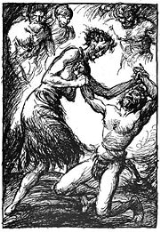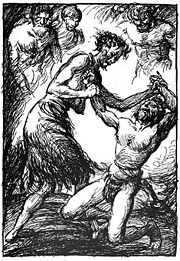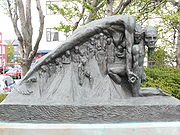
Elli
Encyclopedia


Norse mythology
Norse mythology, a subset of Germanic mythology, is the overall term for the myths, legends and beliefs about supernatural beings of Norse pagans. It flourished prior to the Christianization of Scandinavia, during the Early Middle Ages, and passed into Nordic folklore, with some aspects surviving...
, Elli (Old Norse
Old Norse
Old Norse is a North Germanic language that was spoken by inhabitants of Scandinavia and inhabitants of their overseas settlements during the Viking Age, until about 1300....
"old age") is a personification of old age
Old age
Old age consists of ages nearing or surpassing the average life span of human beings, and thus the end of the human life cycle...
who, in the Prose Edda
Prose Edda
The Prose Edda, also known as the Younger Edda, Snorri's Edda or simply Edda, is an Icelandic collection of four sections interspersed with excerpts from earlier skaldic and Eddic poetry containing tales from Nordic mythology...
book Gylfaginning
Gylfaginning
Gylfaginning, or the Tricking of Gylfi , is the first part of Snorri Sturluson's Prose Edda after Prologue. The Gylfaginning deals with the creation and destruction of the world of the Norse gods, and many other aspects of Norse mythology...
, defeats Thor
Thor
In Norse mythology, Thor is a hammer-wielding god associated with thunder, lightning, storms, oak trees, strength, the protection of mankind, and also hallowing, healing, and fertility...
in a wrestling
Wrestling
Wrestling is a form of grappling type techniques such as clinch fighting, throws and takedowns, joint locks, pins and other grappling holds. A wrestling bout is a physical competition, between two competitors or sparring partners, who attempt to gain and maintain a superior position...
match.
Gylfaginning
In Gylfaginning, Thor and his companions LokiLoki
In Norse mythology, Loki or Loke is a god or jötunn . Loki is the son of Fárbauti and Laufey, and the brother of Helblindi and Býleistr. By the jötunn Angrboða, Loki is the father of Hel, the wolf Fenrir, and the world serpent Jörmungandr. By his wife Sigyn, Loki is the father of Nari or Narfi...
and Þjálfi are in the hall of the giant Útgarða-Loki
Útgarða-Loki
In Norse mythology, Útgarða-Loki was the ruler of the castle Útgarðr in Jötunheimr. He was one of the Jötnar and his name means literally "Loki of the Outyards," to distinguish him from Loki, the companion of Thor.-Prose Edda:According to the Prose Edda book Gylfaginning, Thor, Þjálfi and Loki,...
where they meet difficult challenges testing their strength and skill. Thor has just been humiliated in a drinking challenge and wants to get even.
Then said Thor: 'Little as ye call me, let any one come up now and wrestle with me; now I am angry.' Then Útgarda-Loki answered, looking about him on the benches, and spake: 'I see no such man here within, who would not hold it a disgrace to wrestle with thee;' and yet he said: 'Let us see first; let the old woman my nurse be called hither, Elli, and let Thor wrestle with her if he will. She has thrown such men as have seemed to me no less strong than Thor.' Straightway there came into the hall an old woman, stricken in years. Then Útgarda-Loki said that she should grapple with Ása-Thor. There is no need to make a long matter of it: that struggle went in such wise that the harder Thor strove in gripping, the faster she stood; then the old woman essayed a hold, and then Thor became totty on his feet, and their tuggings were very hard. Yet it was not long before Thor fell to his knee, on one foot. Then Útgarda-Loki went up and bade them cease the wrestling, saying that Thor should not need to challenge more men of his body-guard to wrestling.
Later, when Thor and his company are safely out of Útgarða-Loki's hall the giant explains that Thor's opponent was much more formidable than she appeared to be and that Thor's prowess was, in fact, astonishing.
It was also a great marvel concerning the wrestling-match, when thou didst withstand so long; and didst not fall more than on one knee, wrestling with Elli; since none such has ever been and none shall be, if he become so old as to abide "Old Age," that she shall not cause him to fall.
The story of Thor's visit to Útgarða-Loki is only related in the Prose Edda and, unusually, Snorri does not quote any old poems to support it. His sources for the story are unknown and it has been suggested that he largely composed it himself.
Elli is not mentioned in any other extant source but the notion that not even the gods
Æsir
In Old Norse, áss is the term denoting a member of the principal pantheon in Norse paganism. This pantheon includes Odin, Frigg, Thor, Baldr and Tyr. The second pantheon comprises the Vanir...
are immune to the effects of aging is supported by the fact that they must consume the apples of Iðunn
Iðunn
In Norse mythology, Iðunn is a goddess associated with apples and youth. Iðunn is attested in the Poetic Edda, compiled in the 13th century from earlier traditional sources, and the Prose Edda, written in the 13th century by Snorri Sturluson...
on a regular basis in order to remain young.

